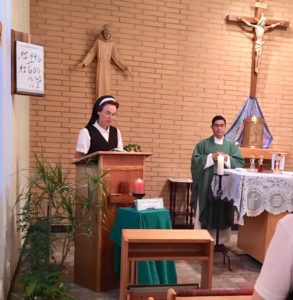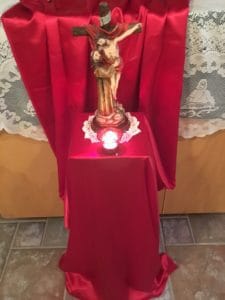Relying on the power and strength of Jesus’ teaching, we share a Franciscan Gospel reflection and questions written by Fr. Paul Gallagher, OFM. They are edited by Franciscan Sister of Christian Charity Sister Anne Marie Lom and Joe Thiel. The excerpts from the Sunday readings are prepared by Joe Thiel. To read or download the complete pdf with excerpts for your prayer, please click here: Franciscan Gospel Refection September 30 2018. Excerpts from the Lectionary for Mass for Use in the Dioceses of the United States of America, second typical edition © 2001, 1998, 1997, 1986, 1970 Confraternity of Christian Doctrine, Inc., Washington, DC. Used with permission. All rights reserved. No portion of this text may be reproduced by any means without permission in writing from the copyright owner. Please include this information when printing.
Photos: Immaculate Conception Convent, Yuma, AZ
Mark 9: 38-43, 45, 47-48
John said to him [Jesus], “Teacher, we saw someone driving out demons in your name, and we tried to prevent him because he does not follow us.” Jesus replied, “Do not prevent him. There is no one who performs a mighty deed in my name who can at the same time speak ill of me. For whoever is not against us is for us. Anyone who gives you a cup of water to drink because you belong to Christ, amen, I say to you, will surely not lose his reward.
“Whoever causes one of these little ones who believe in me to sin, it would be better for him if a great millstone were put around his neck and he were thrown into the sea.
If your hand causes you to sin, cut it off. It is better for you to enter into life maimed than with two hands to go into Gehenna, into the unquenchable fire. And if your foot causes you to sin, cut it off. It is better for you to enter into life crippled than with two feet to be thrown into Gehenna. And if your eye causes you to sin, pluck it out. Better for you to enter into the kingdom of God with one eye than with two eyes to be thrown into Gehenna, where ‘their worm does not die, and the fire is not quenched.’ ”
Background
This gospel text follows the Gospel from last Sunday, where Jesus confronted the disciples who had been arguing about who was the most important among them. In response, Jesus told them that those who desire to be first must be servants of all.
The apostle John again raises questions about discipleship. In their culture, it was important for the disciples to have a sense of belonging and a strong connection with their leader, Jesus. For someone not of their group to be able to use the name of Jesus to expel evil spirits threatened the disciples’ sense of belonging. Adding to their uncertainty around their relationship with Jesus was the fact that earlier in this chapter they tried to expel a demon from a boy but were unable. (Mark 9:14-19) Jesus’ response to John is counter to the values of their culture. He simply lets the disciples know that their need to have an insider or exclusive relationship with him is not a value he shares. It is more important that the work of God be done, rather than who is doing it. Jesus stresses the point in verse 41 by saying God will recognize anyone who so much as gives another a cup of water. However, giving another a cup of water in Jesus’ time was more difficult than in our own time, and could have meant the difference between life and death.
The second part of this gospel also addresses the sense that the disciples have exclusive access to Jesus or God. Jesus instructs them that God cares for even the little ones–not just children, but all those who seem unimportant. While these little ones, like children of the day, may appear to be insignificant and even expendable to most people, in the eyes of God they are of great importance. They are so important that if anyone would be a source of scandal to any of them, it would be better that a millstone be placed about their neck and they be thrown into the sea to drown. This was a humiliating form of execution because it typically was used by the Romans.
In the remaining verses of this text Jesus describes other forms of restraint for those who find themselves being led into sin. Most who hear this gospel find the idea of cutting off one’s hand or plucking out an eye as extreme. But those who Jesus is addressing would not be shocked. Such punishments were not uncommon, and they carried severe consequences. People without limbs or sight did not have access to modern forms of assistance as some do today. Without fully functioning bodies, people became isolated and lived desperate lives. Jesus was trying to make a point about the seriousness of being the cause for another to sin.
Reflection Questions
1. Do you belong to clubs or organizations that charge members for their services? How would you feel if you found out that other people were receiving the same services for free?
2. Do you ever get jealous of the apparent blessings of others?
3. Do you feel like you are part of God’s inner circle? Would you like to be?
4. When you hear of John telling Jesus that they had tried to prevent an outsider from driving out demons…
5. When you hear Jesus tell his disciples that it would be better for one to have a millstone put around their neck and thrown into sea rather than cause a “little one” to sin…
6. When you reflect on the effects of your own sin on yourself and others…
7. Are you ever concerned about family members who are no longer practicing members of the church? Does this gospel text give you any new understanding about how God might look upon them?
8. Can you take some time to talk with God about your relationship to God and how that influences your relationship to “little ones,” or about some other consideration that arose as you reflected on this gospel text?




